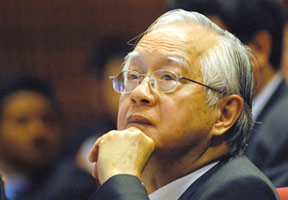Building a bridge to universal prosperity
- By Wu Jinglian
 0 Comment(s)
0 Comment(s) Print
Print E-mail
China.org.cn, January 27, 2012
E-mail
China.org.cn, January 27, 2012
After 30 years of rapid development, China has made significant achievements in three areas: An annual GPD growth rate approaching 10 percent, improved living standards and progress in poverty reduction.
|
|
|
Wu Jinglian, professor of economics at the Chinese Academy of Social Sciences [file photo] |
China has improved the living standards of some 350 million people who were previously poverty-stricken, and has, according to World Bank standards, risen rapidly up the Human Development Index since the implementation of its reform and opening-up policy.
However, poverty alleviation does not equal poverty elimination, and certainly does not signal the advent of universal prosperity. In fact, China's economy still faces many big obstacles, despite the great progress that has been made to date.
What causes the gap between the rich and the poor? I think there are two reasons: corruption and monopoly. Both of these factors are related to government power.
Our monopoly is not the result of free market competition. Rather, it is the result of interventions by those in positions of power and influence. For example, Sinopec was ranked first in terms of net profits in 2009. However, it was discovered that the company's former CEO, Chen Tonghai, spent 40,000 yuan (US$6,327) per day for leisure and personal purposes after he was arrested in connection with accepting bribes.
So, essentially, when people say they hate the rich, what they mean is that they hate corruption.
In order to build a democratic, civilized and harmonious modern country, we must first create conditions in which ordinary people can get rich. The key reason for ordinary people's insufficient consumption is that their incomes are insufficient.
Investment-led growth can only increase the capital, while capital increase can be divided into two parts: state capital and rich people's capital. National capital can only increase state revenue and the profits of state-owned enterprises. Increasing rich people's capital can only make rich people richer.
The key to solving this problem lies in transforming growth patterns and upgrading industry.
As China is principally a manufacturing country, it has to extend the manufacturing body to both sides - the service industry. The two sides are connected with service in the traditional sense, whether in terms of a front end process such as R&D and design, or back end processes such as brand marketing, channel management or after-sales service. The result of extending to two sides is that the service industry will become independent.
In order to create conditions whereby ordinary people can become rich, we also need economic and political reform. We have to realize the ambition of Deng Xiaoping in the 1980s, when he said: "Economic and political reform should be interlinked and interdependent. Carrying out economic reform without engaging in political reform dooms such economic reform to failure."
In addition, it's important to mention the establishment of the rule of law within the state framework. So far, this has been hampered in both the legislative and judicial aspects. In order to create the favorable conditions necessary for universal prosperity, we must first ensure that ordinary people are able, and willing, to voice their opinions.
(This article was first published in Chinese and translated by Lu Na.)
Opinion articles reflect the views of their authors, not necessarily those of China.org.cn.







Go to Forum >>0 Comment(s)